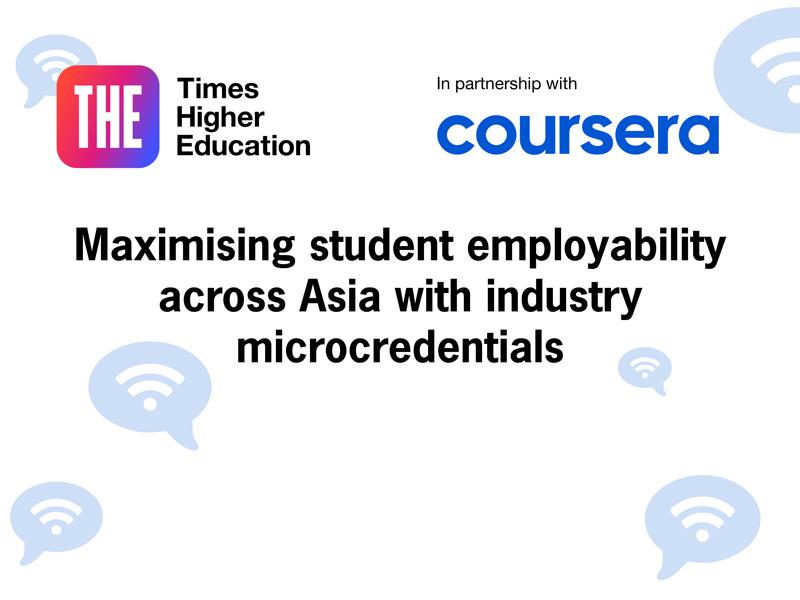Strengthening university-industry collaboration and modernising pedagogical methods are two efforts adopted by many universities to enhance student experience and employability. However, graduates need to be better equipped with soft skills to meet the fast-changing demands of the world of work.
A round table discussion, held during Times Higher Education’s Digital Universities Asia 2023 event in partnership with Coursera, brought together leaders from academia and industry to discuss higher education’s ongoing efforts to effectively embed industry-aligned curricula and blended learning. The panel explored how universities can overcome modern challenges to support graduates and professionals to thrive in the workplace.
Sharing the results of a recent Times Higher Education Consulting survey about microcredentials, Chong Xiu Ting, senior research analyst at THE, revealed that 86 per cent of 500 students across Asia firmly believe that microcredentials can make them stand out to their employers, thereby enhancing their employability.
Microcredentials can be a great way to support learners in reskilling and upskilling. “The intent of a microcredential is to say, ‘can we enable the learner to [gain the skills] to start a career in that field?’,” said Raghav Gupta, managing director of Asia Pacific at Coursera. Microcredentials are “typically aligned with specific jobs”, which means they are designed to help learners gain the specific skills they need to succeed on their career path.
Lily Chan, chief executive and vice-chancellor at Wawasan Open University, explained that WOU integrates Coursera courses to design industry-aligned curricula, allowing the university to upgrade its course content to improve students’ employability.
Integrating soft-skills education can be more of a challenge. The panel agreed that to meet the rapidly changing demands of industry, students have developed “the right mindset, knowing that [their] personal life is different from the professional life” but are yet to develop “the right skills that are needed to be successful in a particular role”, said Eklavya Bhave, head of Asia at Coursera.
In addition to integrating microcredentials into curricula, the panellists also recognised the need to modernise pedagogy. Venky Shankararaman, vice-provost of education at Singapore Management University, explained that the university’s blended learning approach allowed teaching staff to assign pre-class activities to students, leaving more time for in-depth discussion in the classroom.
Kevin Lowrence, chief executive at UNITAR International University, noted that students who engage with their course, as well as extra-curricular activities and microcredentials, will build the diverse knowledge and soft skills that will help them succeed after graduation. However, motivation to complete modules can be a challenge. Universities must support students to reduce attrition rates, Lowrence concluded.
The panel:
- Janice Bello, chief information officer and vice-president, Ateneo de Manila University
- Eklavya Bhave, head of Asia, Coursera
- Lily Chan, chief executive and vice-chancellor, Wawasan Open University
- Ho Chin Kuan, vice-chancellor, Asia Pacific University of Technology and Innovation
- Hrridaysh Deshpande, vice-chancellor, Ajeenkya DY Patil University
- Gitanjali Goswami, branded content manager (APAC), Times Higher Education (chair)
- Raghav Gupta, managing director, Asia Pacific, Coursera
- Hiroshi Kawahara, chief executive officer and president, Cyber University Japan
- Yeo Lay, vice-dean of students for the Student Success Centre, Singapore University of Social Sciences
- Kevin Lowrence, chief executive, UNITAR International University
- Galvin Radley L. Ngo, assistant director of the SALT Institute and coordinator for innovation and education technology, Ateneo de Manila University
- Tirso A. Ronquillo, president, Batangas State University and Philippine Association of State Universities and Colleges
- Venky Shankararaman, vice-provost of education, Singapore Management University
- Zohrah Sulaiman, vice-chancellor and president, Universiti Teknologi Brunei
- Akito Takasaki, vice-president, Shibaura Institute of Technology


comment